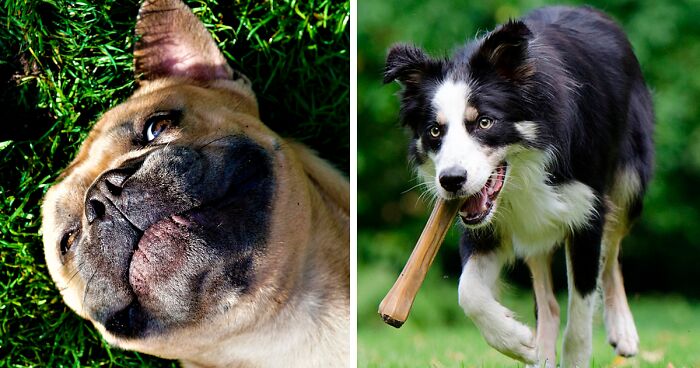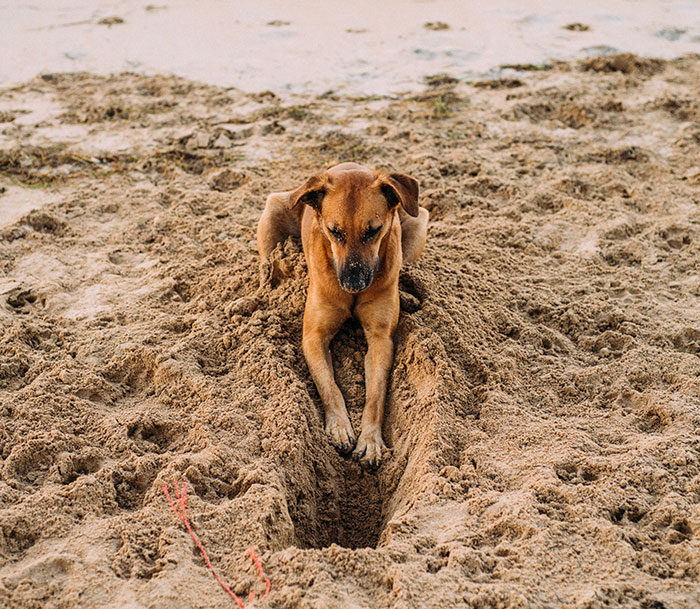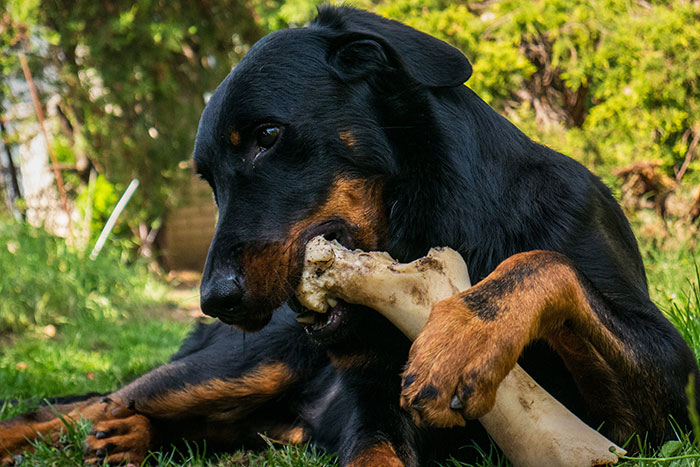The tendency to bury food or toys is something many associate with dogs, sometimes with cats, whether we are lucky enough to have a pup as a pet or not. The actual reasons why canine behavior can involve an instinct to bury a few exciting reasons, which we’ll explain in this article.
Disclaimer: Please refer to the information in this article as a guide only. If you are worried about your pet’s health or behavior, it’s best to contact your veterinarian.
- Dogs may bury items as an instinct to keep them safe for later use.
- Burying behavior could be enjoyable for dogs, providing fun and enrichment.
- Dogs inherited burying habits from ancestors to preserve food for leaner times.
- Remember to check your dog's paws if they dig regularly, to prevent irritation.
- Breeds like Retrievers, Terriers, and Beagles are often known to enjoy burying.
The information provided herein is for informational purposes only. Please refer to our disclaimer for more details..
Reasons why dogs hide things
So let’s now take a look at why dogs bury things or anything they consider valuable, such as toys and food.
For Protection
Image credits: Laura Stanley.
A dog’s tendency to bury bones and other items can relate to a dog’s ancestry. This is because they may have an instinctual need to keep their things safe until a time when they can or need to use them.
The urge to bury means that a can enjoy and come back to a buried item when it suits them best. In the wild, this could be helpful when escaping from predators or when raising young puppies.
Keeping ”treasures” safe can help anxious dogs feel calmer and give them the freedom to come back to them when they are ready.
For Fun
Just like us, domestic dogs may enjoy burying their things just for fun. This behavior could stem from dogs burying their things to protect them but also could be related to enjoyment and enrichment. Dog behavior can be influenced by a variety of factors and it could be that they find burying things particularly fun.
Unless you think that your dog’s digging is related to something negative, such as separation anxiety, then it’s probably best to let them enjoy it. If however, the digging is problematic or you want to save your lawn, you might need to think of other options.
This could include, fencing off a ‘dog play area’ or initiating play to distract your dog from digging. Whatever you do, it’s not a good idea to punish your dog for digging. If you need help managing a dog who loves to bury then talk to your veterinarian or an animal behavior expert.
To save their food for later
Image credits: Alisa Savickaja.
Burying excess food and saving it for leaner times, is survival behavior inherited from a dog’s wild ancestors. In the past, wild dogs were likely to bury excess food to keep it safe. The temperature difference and decreased amount of oxygen could have preserved the food. This meant that later on, if food was scarce, then they could come back to eat and still have something to eat.
Dogs have a very keen sense of smell and are pretty likely to remember where they initially buried their prize bone, so they can be sure to remember where it is when they decide to save it for later.
Is it ok if my dog digs?
If your dog enjoys digging, then it’s usually not a cause for concern. However, if your dog is prone to digging, we recommend that you check their paws regularly in case there are any problems.
Constant digging can irritate your dog’s paws and may cause them to be sore. Additionally, during digging they may come into contact with harmful materials such as glass or chemicals in the soil.
If your dog likes to dig, it is best to encourage them to do it in a place that you know is safe, such as your garden or lawn (which will also keep your neighbors happy).
When your dog comes in from their dig, you’ll probably also want to wipe their paws with a towel before they come inside.
Additionally, whilst we’re on the topic of dogs and digging, it’s good to know that you should never let your dog eat or chew bones. Bones can damage your dog’s mouth, teeth, and gastrointestinal tract, and it’s better to avoid giving your dog bones or having access to them.
If your dog loves to chew, then there are a variety of safer dog chew toys and treats available.
If you’re worried about your dog’s behavior and are sure that they are clinically healthy, then you might want to refer to an animal behaviorist or specialist veterinarian for advice.
FAQ
What does it mean when a dog buries a bone?
As we mentioned earlier, dogs can bury bones for a variety of reasons such as:
- For Protection.
- For Fun.
- To save their food for later.
The above reasons, although slightly different, likely stem from an instinct to dig and bury, which all dogs likely have. Many canine behaviors derive from a dog’s instinct to save and protect themselves, especially when it comes to food.
If your dog likes to bury anything they deem valuable, it’s not a strong reason for concern, unless you notice nothing something abnormal in their health or behavior, or if the digging is causing them harm.
Do dogs remember where they bury their bones?
Yes, dogs tend to remember where they bury their bones. This is to make sure that they will be able to find them again when they want them back. Dogs have an incredibly strong sense of smell, and likely use their nose to help them find previously buried items.
Dogs are also particularly clever in making sure that they bury the bone deep enough that other animals or even wild dogs cannot smell it and take it away. It’s unlikely a dog would bury their ”treasures” if they are not sure to find them again!
If your dog tends to forget where they buried a bone, then pet parents can help by marking the (if it’s in your backyard) and showing their doggy where to dig.
What breed of dog likes to bury bones?
Some different dog breeds are known for specific characteristics. For example, dachshunds are known for burrowing to look for animals during hunting. Herding breeds, such as collies, are known for being superb shepherds and agility dogs.
When it comes to breeds that particularly like to dig, and hence enjoy burying bones, the following dog breeds are often referred to:
- Retrievers.
- Terriers.
- Beagles.
However, a love of burning bones is not just related to a dog’s breed. It most likely is also affected by their character, physical condition, and environment. This means, that although digging is commonly associated with hunting breeds, it’s not limited to them. No two dogs are the same, and digging or burying behavior can be associated with different breeds of pooch.
Conclusion
We hope you’ve enjoyed finding out a little more about why dogs bury bones and toys. If you’re worried that your dog’s instinct to dig may have gone a bit too far, it’s best to contact your veterinarian or an animal behavior expert.
Have you had an interesting experience with a dog who likes to bury toys or bones? Tell us about it in the comments below!
158views
Share on Facebook
 Dark Mode
Dark Mode 

 No fees, cancel anytime
No fees, cancel anytime 




















































10
0